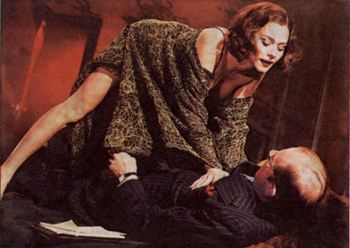Anna's bewitching Lulu is the femme
with a fatale guile
|
This warning-shot play, first fired just over
100 years ago and aimed at men who cannot resist a femme fatale's siren call,
still maintains its capacity to disturb. Frank Wedekind's Lulu, as
Jonathan Kent's production makes strikingly clear, describes a woman's revenge
in a world where females are regarded as property in marriage or vehicles to be
ridden recklessly for pleasure outside it. Sex is treated with a dark,
sophisticated cynicism that make Ibsen and Chekhov seem old-fashioned by
comparison. Wedekind despised the late 19th-century fear of sexual freedom and
hypocritical attempts to repress teenage sexuality: Anna Friel's fascinating
Lulu, a cross between one of those swooning, silent-movie vamps and an older,
sexier sister of Lolita's, has something of a damaged, conscienceless
little-girl lost about her. |

|
Kent's production of this neglected tragi-comedy
launches the Almeida upon 18 months exile, while its theatre is improved.
Sadly, the Almeida's temporary home, conjured out of a disused coach station
near King's Cross, is hideously unappealing. Some £850,000 has been
wasted on transforming this vast space. Why not move to an already existing
playhouse? The stage is too big, broad and deep for the Almeida's style of
intimate playing. Rob Howell's set, with its screen of semi-opaque glass panels
smudged with silver and black colours, decorates rather than helps the action
on the yawning stage. Voices are in danger of being swallowed up in this
vastness. The bench seats are overpacked, allowing too little space per person.
Perhaps Mr Kent would explain why he contemptuously inflicts such discomfort
upon theatre-goers.
The spiritual discomfort caused by Lulu is,
however, decidedly bracing. Scorning the well-made play's traditional format,
Wedekind traces the decline and fall of Lulu in five acts and three countries.
Alan Howard's nonchalantly amoral newspaper editor, caught up in sex and drugs
rather than deadlines, a crooked banker selling shares and James Faulkner's
blackmailing Marquis, all represent the male world of power and influence by
which Lulu is ultimately defeated.
Wedekind's outspokeness, his eagerness to say out
loud what was hardly said in whispers, characterises the play. Lulu, abused in
childhood, retaliates in maturity by exploiting and enjoying men, until the
figure who watches the action from the sidelines plays his destructive hand.
She's a rare, 19th-century stage-girl who revels in lashings of sex without
thought of love and commitment. The appeal of Miss Friel's sexy performance
depends upon its restraint, guile and cool. When she flaunts or flashes - a
bare bottom or a complete thigh - it's done with child-like glee and
naughtiness. In her first scene, posing for a picture commissioned by one of
her old husbands and painted by James Hillier's smitten young painter, she
wears little more than tassels and strategic pom-poms, but makes no exhibition
of herself. And the deaths of three husbands leave her calm and
callous.
Kent's exuberant production falters in scenes of
scenes of Parisian and London decline: the atmosphere is far too 21st century.
But the Fedyeauesque sequences in which Howard's beautifully suave editor
observes his own son (a rather wooden Oliver Milburn) pleasuring Lulu goes with
a comic swing. And in a dilapidated London attic, with Tom Georgeson as Lulu's
putative daddy going absurdly over the top, Miss Friel's screams bring this
valuable play to the right awful finale.
Nicholas de Jong
The London Evening Standard,
20.3.01.
